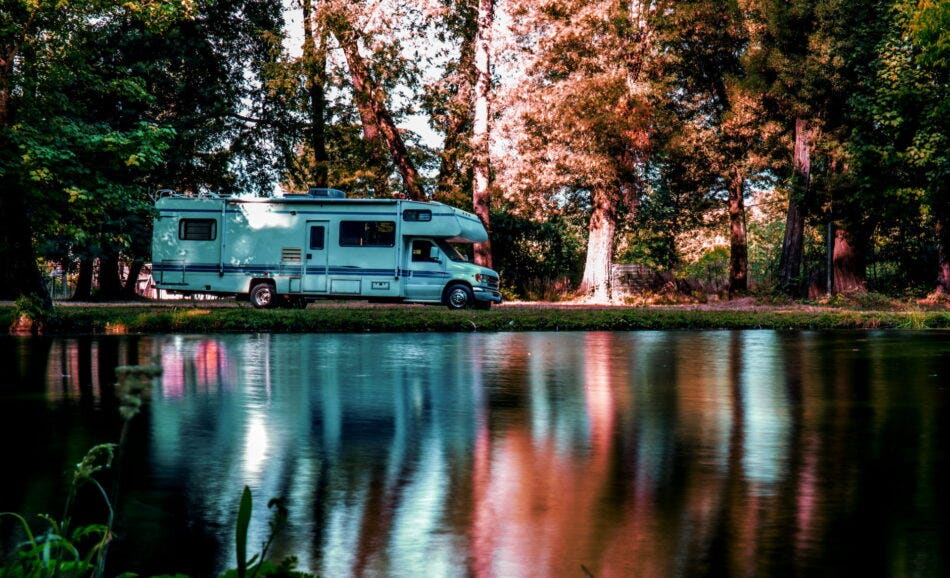The floods of 2013 and the fires of 2016 saw many Albertans fleeing their primary residences in their RVs – which in many cases would become their temporary homes. Brian Crundwell lived in his RV for more than a year after his home was submerged in eight feet of river and sewage water for 22 days . He wasn’t the only one. According to this article by the Globe and Mail almost 1000 Albertans were in temporary accommodation (including RVs) over a year after the floods.
The Fort Mac fire in 2016 was similar. Karie Farrel and her family were one of many residents who evacuated the city in their RV or purchased one shortly after to provide shelter for themselves. Many headed to various RV parks or to the homes of family and friends to set up camp until they could return. Fort McMurray spent $1.63 million outfitting a temporary trailer park in the north end of the city for residents whose homes had been destroyed as well this closed in the fall of 2016 forcing people to park in the driveways of friend’s houses or vying for spots in RV parks.
While living in an RV is not necessarily ideal (especially in the winter or with a big family) it’s an affordable option and can be done more easily with some preparation. While we hope you never have to use your RV to escape or live in during an evacuation or emergency situation they can be a lifesaver in trying times. This article will discuss how to prepare your RV in the event you need to use it in such a situation.
Preparing to Use Your RV in the Event of an Evacuation
It’s always better to be prepared. If you wait until an actual emergency occurs you may be unable to have what you need. Ensure your RV is prepared for emergency use by doing the following:
- Develop an emergency evacuation plan.
- Keep an emergency kit in your RV.
- Keep copies of important documents and information.
- It’s a good idea to have a paper copy as well as a copy stored on the cloud.
- Important documents include birth and marriage certificates vehicle registration insurance documents passports social security cards driver’s licences bank and credit cards banking and utilities account and contact information and any contracts or other important documentation you may have.
- Keep your RV clean and organized after your last trip.
- Have extra fuel on hand (gas and propane depending on your unit).
- Keep the grey and black water tanks emptied and clean.
- Consider buying a portable generator or solar panels (if you don’t have them already).
Remember that every family member should be aware of the plan and what their role in it is. Don’t forget about your pets either!
Your RV Emergency Kit
Many of the items below would likely live in your RV full time anyways but listing everything out is helpful as a checklist. Make sure you fresh the food and fuel and store both in secure containers to deter pests and spills respectively. IF you have kids or pets make sure you include any specialty items such as food and carriers.
Here’s what you should keep in your RV in the event of an emergency:
- First aid kit which includes:
- tweezers
- thermometer
- cleaning solution or cleaning wipes
- bandages for minor cuts and blisters
- skin rash cream
- antiseptic cream
- sterile gauze pads
- triangular bandages
- rolled bandages
- adhesive tape
- safety pins
- disposable sterile gloves
- painkillers
- antihistamines
- distilled water
- instant ice packs (or keep an ice pack or bag of peas in the freezer)
- emergency blanket
- first aid manual
- Battery or crank-powered radio
- Water (bottled or in a bigger container)
- Scissors or knife
- Garbage bags
- Toilet paper
- Duct tape
- Flashlight
- Blankets and sleeping bags
- Power bank or solar phone charger
- Toiletries
- Basic tools
- A few games and toys
- Extra clothing
- Basic cooking equipment
- Food
- Dried goods like cereal pasta trail mix
- Canned food like vegetables sauce tuna
- Pantry staples like salt and pepper peanut butter and olive oil
The recommendations above go beyond a typical emergency kit to include items you would want in the event you’re living in your RV beyond a couple of days. Remember it’s okay if you don’t have everything as you can always buy what you need once you’re safe. Just keep all receipts – they’re essential for your insurance claim.

